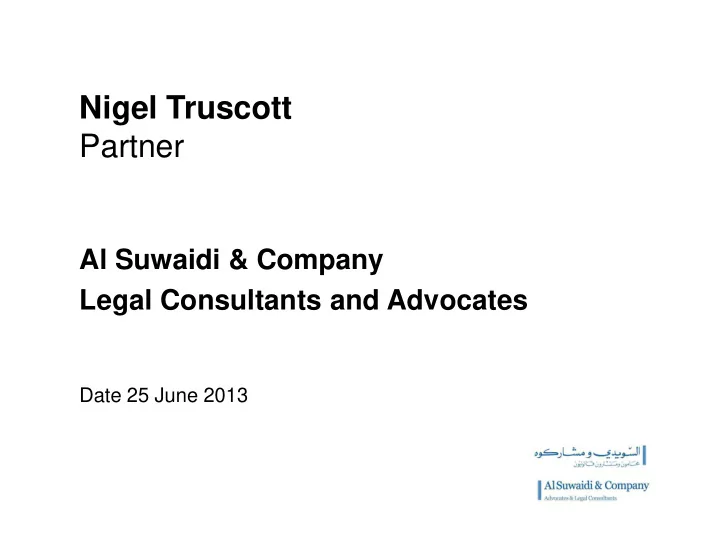

Nigel Truscott Partner Al Suwaidi & Company Legal Consultants and Advocates Date 25 June 2013
Effective Evidence in Arbitration - increasing chances of success by making the most of your evidence
Look through the smokescreen for the answer
Aim of Evidence • Level of proof : Each party alleging an obligation must prove such obligation existed and party alleging to be freed from an obligation must prove the circumstances extinguishing such obligation • Reasoning : inductive – draws information from observations to make ‘highly likely’ generalizations deductive – if premises is true then conclusion is true
An example of an inductive argument • The project team meets each Thursday morning at 9:00 in the site office. • Ian attends project meetings regularly. • Ian has to go past my office when he attends the project meetings. • It is highly likely that I will see Ian on Thursday about 9:00 An example of a deductive argument • All cats have a tail. • Felix is a cat. • Therefore, Felix has a tail.
Types of Evidence • Documents • Real/physical evidence • Oral/ factual witness • Expert witness
Documents • General or specific/relevant disclosure • Organization • Presentation - text referencing • Requests for disclosure – Law of Proof in Civil and Commercial Transactions no 10/1992 (as amended by Law no.36/2006) Articles 17, 18 & 19
Real/physical evidence • Inspection – planning • Preservation - attachment orders, photographs • Samples – method, accuracy • Public policy - “serious departures from fundamental notions of procedural justice”
Oral/factual witnesses 1 • Procedure – direct or exchange advance of hearing • Preparation – opinion and hearsay evidence • Supporting documents and/or photographs • Co-operative and hostile • Oath - sequestration • IBA Rules of Evidence
Oral/factual witnesses 2 • Examination-in-Chief • Cross-examination – leading questions • Re-examination • Tribunal questions • Party clarifications
Cross-examination Typical questions that might be asked in cross-examinations: Q: “You stated this morning that you saw the steel was cracked. Why didn’t you mention this in your site report of 10 June?” Q: “You worked on site for the claimant for two months last winter?” A: “Yes.” Q: “You were dismissed and were refused a reference. Why was that?” Q: “You said that the steel was in good condition when it was delivered on 4 November. Did you inspect it? All 100 tons of it? How long did that take you? Could you now look at your site diary for 4 November?”
Re-examination Re-examinations: Q: “To whom was your site report of 10 June sent?” A: “The accounts department.” Q: “After your dismissal, what job did you take? How long have you been there? Have you been promoted?” Q: “On 4 November, what time was the steel delivered to site? How long did the delivery process take? What did you do between the end of the delivery and your next meeting?”
Leading questions 1 A leading question is one that “leads” the witness to the answer. Q: “Was it 4 pm when you met the MEP Subcontractor?” Q: “Do you know the exact time because you had finished your regular main site meeting?” Q: “Did you have to call the security guard because you had locked yourself out of the office?”
Leading questions 2 The correct questioning should have been: Q: What did you do then? A: I met the MEP Subcontractor. Q: When was this? A: 4pm. Q: How can you be so sure of the time? A: I had just finished the 3pm regular one hour site meeting. Q: What did you do then? A: I called the security guard. Q: Why did you call the security guard of your office building? A: I had locked myself out of the office.
Expert witness • Party or Tribunal appointed • Mandate and rules of conduct • Reports – joint, supplemental and reply • Without prejudice meetings • Giving evidence – on fact and opinion based on the facts ; distinguished from legal responsibility • Present or not to be present ?
Recommend
More recommend